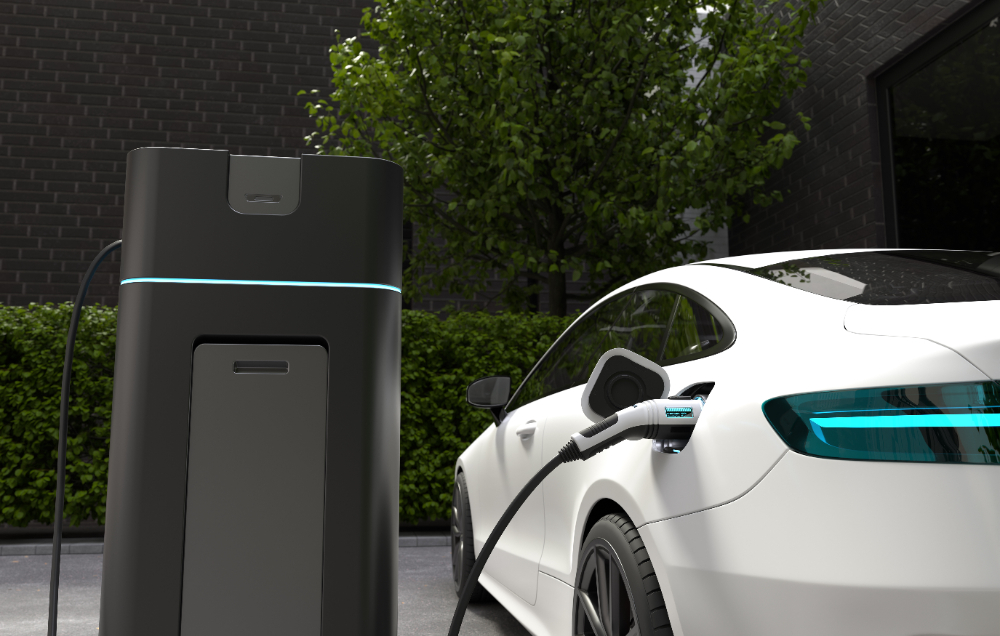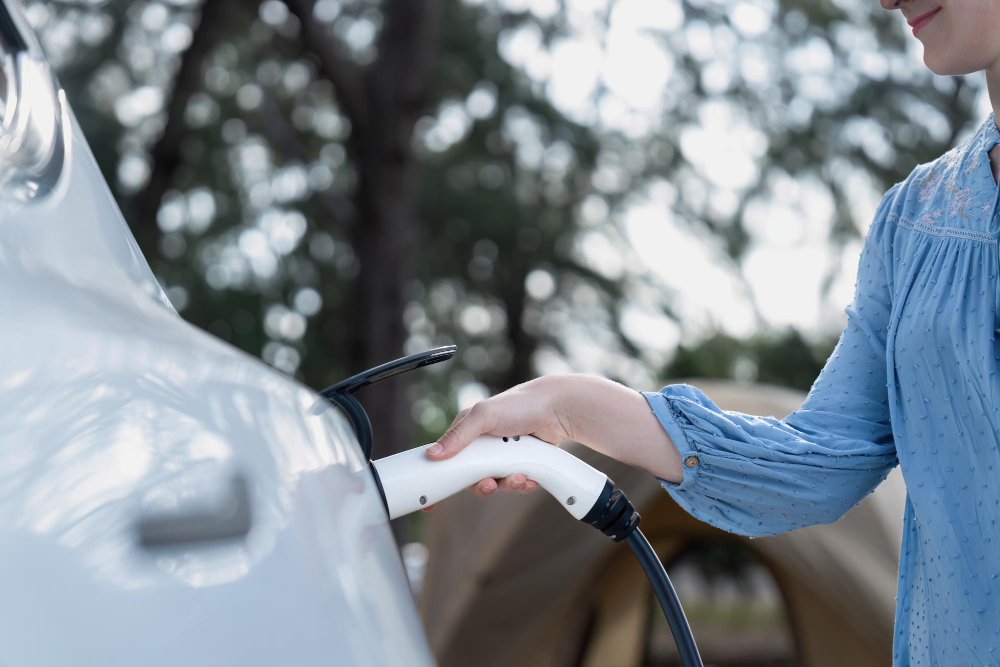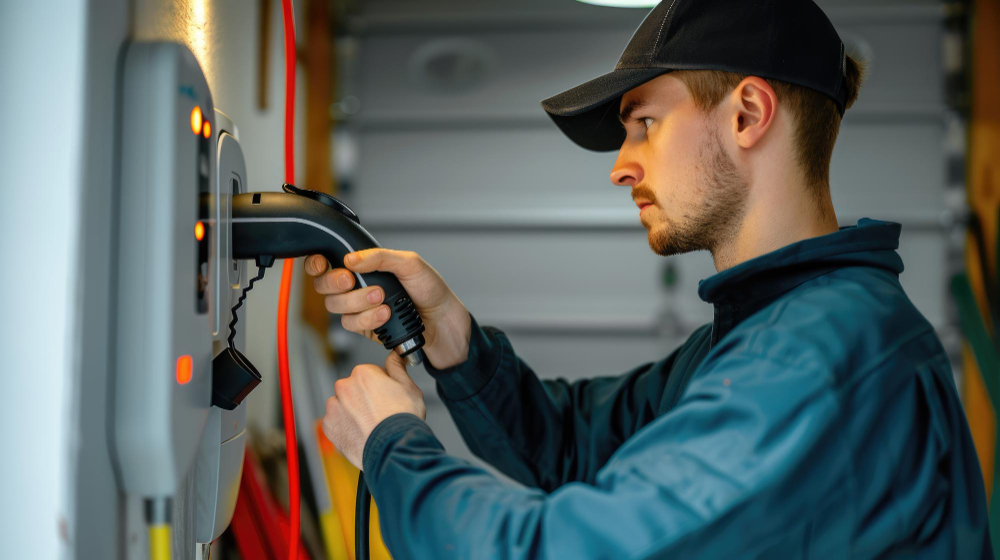Electric car owners face a pressing question as electricity prices continue to rise: what’s the true cost of running their vehicles? Electric vehicles offer savings compared to petrol cars, but the charging costs aren’t always easy to calculate.
Several factors determine your home charging expenses. Your electricity tariff plays a crucial role, along with the type of charging unit installed at your property. The choice between a standard socket and a dedicated home charger significantly affects your overall costs, making it essential to understand these elements before committing to electric car ownership.
Let’s examine every aspect of home charging costs in this piece. The discussion covers everything from the original setup to daily running expenses. Smart tariffs can help reduce your charging costs, and practical examples will show you how charging your electric car at home affects your finances.

Understanding Home EV Charging Basics
Electric car owners need to understand their home charging options to make smart decisions. Let’s look at everything in home charging that will work best for our needs.
Types of home charging units available
Electric car owners can choose between tethered and untethered chargers. Tethered units come with a built-in cable that makes regular charging easier. Untethered chargers work with any compatible charging cable and give us more flexibility, but we need our own cable.
Standard socket vs dedicated charger comparison
A standard three-pin socket can charge our cars, but it’s not the best long-term option. Dedicated home chargers are a great way to get these benefits:
- Charging Speed: A dedicated 7kW home charger charges up to three times faster than a standard socket
- Safety Features: Home chargers handle continuous high-power usage safely, while standard sockets might overheat
- Convenience: Wall-mounted chargers eliminate cables through windows or doors
Charging speeds and power ratings explained
Our home’s electrical setup and charger type determine the charging speed. Here’s what to expect:
- Standard Socket: Delivers up to 2.3kW, adding only 4-5 miles of range per hour
- 7.4kW Home Charger: Adds about 25 miles of range per hour
- 22kW Charger: Adds around 75 miles of range per hour, but needs three-phase power – rare in UK homes
UK homes typically have single-phase power that limits charging to 7kW. Faster chargers exist but you’ll find them mostly in commercial properties with three-phase power. A 7kW home charger meets most people’s needs and matches their home’s power supply.
Charging times depend on your car’s battery size. A car with a 63kWh battery takes about 10 hours to charge fully with a 7kW wall box. This makes overnight charging perfect for most electric car owners.

Initial Setup and Installation Costs
A home charging system setup needs proper budgeting. Let’s look at the costs you need to plan for your home charging solution.
Home charger equipment prices
Home charging equipment costs depend on power output and features. A simple 3kW charger ranges from £250-£500, and a 7kW unit costs between £450-£800. You’ll need about £1,000 for a complete package with installation.
Smart chargers that include app control and solar integration come at a premium price starting at £1,145. These advanced units help you control your charging schedule better and reduce costs over time.
Professional installation requirements and fees
A certified professional must install your charging point. The process takes about three hours and includes:
- Connecting the unit to your home’s electricity supply
- Mounting the charger on an exterior wall
- Testing and safety certification
Professional installers charge £45-£60 per hour. You might need extra work like:
- Fuse box upgrades: £350+
- New isolator switch: £100-£200
- Security lighting: £150-£200

Available grants and financial support
The government provides financial support through several schemes. Eligible applicants can get up to 75% of the installation cost covered, with a £350 cap. These grants are available to:
- Flat owners
- People in rental accommodation
- Landlords with residential properties
Scottish residents can get an extra £300 wall box grant if they live in rural areas. Businesses can benefit from the Workplace Charging Scheme, which offers up to £350 per socket for up to 40 sockets.
An OZEV-authorized installer will handle your grant application. The grant amount comes off your final bill, which makes the whole process simple and straightforward.
Calculating Your Daily Charging Costs
Your electricity bill reveals the exact cost of charging your electric car at home. Let’s examine these costs and find ways to make charging cheaper.
Energy tariff considerations
Your electricity tariff plays a crucial role in charging costs. Standard UK electricity rates average around 30p per kWh. Energy providers now give special EV tariffs that can cut charging costs substantially.
Popular EV-specific tariffs include:
- British Gas Electric Driver with 7.9p/kWh during off-peak hours
- E.ON Next Drive offering 6.7p/kWh during off-peak periods
- Octopus Go with rates as low as 7p/kWh during designated times
Peak vs off-peak charging rates
Peak and off-peak rates differ greatly. Daytime rates can reach 30p/kWh, while off-peak rates between midnight and 5am cost much less. Night charging saves money – from about £8.50 per 100 miles at standard rates to just £2.29 using off-peak tariffs.
Ground consumption examples
Daily costs become clearer with actual usage figures. A typical electric car owner:
- Uses around 2,800 kWh yearly to drive 8,000 miles
- Needs between 14-26 kWh per 100km based on season
- Uses about 17.5% extra energy due to charging losses
To cite an instance, see a monthly drive of 633 miles. This adds roughly £48 to your electricity bill on a standard tariff. Switching to an EV-specific tariff with off-peak rates could lower this to £15 monthly.
Efficiency changes throughout the year. Summer consumption stays low at 14 kWh/100km but climbs to nearly 26 kWh/100km in winter. Despite these seasonal changes, charging costs remain cheaper than fuel costs. Petrol or diesel costs average 19-21p per mile compared to just 3p per mile for electric charging.
Smart Charging to Minimise Costs
Smart technology is revolutionising electric car charging and provides clever ways to reduce charging costs. Let’s look at how these state-of-the-art solutions help us save money while keeping our cars ready to go.
Time-of-use tariff optimisation
Smart charging lets us make use of cheaper electricity rates during off-peak hours. Studies reveal that people who skip smart charging pay 18.1% more per MWh than those who don’t. Moving our charging schedule to quieter times saves money and helps balance the electricity grid.
Time-of-use tariffs cut our energy bills by a lot. Recent data shows that households can reduce their annual energy costs by 25-132% in major European markets. The smart charger schedules charging automatically at the cheapest times, usually during night hours.
Solar panel integration benefits
Home charging setups with solar panels deliver substantial savings. Here’s what we can achieve:
- Generate power at a lower cost than grid electricity
- Sell excess energy back to the grid for additional savings
- Reduce our carbon footprint while charging
The Energy Saving Trust calculates that a typical 4kW solar array saves over £400 yearly on energy bills. Solar panels combined with smart charging let us power our car with free solar energy on sunny days and switch to cheap off-peak rates when needed.

Smart meter advantages
Smart meters are crucial to maximise charging savings. They work with our energy supplier to:
- Accurately track when we use electricity
- Enable special EV-friendly tariffs
- Record energy usage during cheaper rate periods precisely
Smart meters help us monitor charging costs live and adjust our habits. The data indicates that smart charging could lower our annual charging costs to £250 or maybe even charge for free with home solar power.
These three elements – smart charging, solar panels, and smart meters – create an intelligent charging system that picks the cheapest charging times automatically. This setup saves money and creates a more stable and efficient power grid that benefits everyone.
Long-term Cost Analysis
The sort of thing I love about switching to an electric vehicle is how the long-term financial picture helps us make smart decisions. Let’s get into how the numbers add up over time.
Annual charging cost calculations
Our charging costs vary by a lot based on our charging habits. A typical household that charges at home spends about £568 annually for 10,000 miles of driving. This comes to roughly 6p per mile, nowhere near the 14p per mile for petrol vehicles.
These factors affect our annual charging expenses:
- Home charging (standard tariff): £973 per year
- Mixed charging (70% home, 30% public): £786.78 per year
- Public charging only: £1,297.78 per year
Maintenance and running costs
Electric vehicles save us money on maintenance. EVs cost 23% less to maintain over a three-year, 60,000-mile period. We save because:
- EVs have fewer moving parts that need replacement
- Oil changes and filter replacements aren’t needed
- Service intervals stretch up to 18,000 miles for some models
Service plans cost less too. A three-year service plan for an electric car runs £299, while petrol cars need around £499.
Comparison with petrol/diesel expenses
Numbers tell the story clearly. Recent data shows electric vehicles save us £528 annually compared to petrol cars. A typical driver who covers 8,000 miles yearly spends £1,111.82 on petrol alone.
Here’s a detailed cost breakdown:
- Electric car annual running costs: £1,742 (£33.50 per week)
- Petrol vehicle annual running costs: £2,205 (£42.40 per week)
Efficiency keeps improving. The Hyundai IONIQ Electric costs just £3.75 per 100 miles to run. Even with standard home electricity rates of 28.62p per kWh (January-March 2024), we spend less than petrol cars.
The data shows 42% of EV owners find more ways to cut costs through smart driving habits, such as steady speeds and lighter loads. Smart charging practices and home charging solutions help us save up to £1,000 yearly compared to petrol vehicles.
Conclusion
Home EV charging works out cheaper than traditional fuel costs. The original setup needs investment and careful thought, but smart charging solutions and off-peak tariffs can bring down running costs to just 3p per mile – much less than what you’d spend on petrol.
The math adds up nicely. You can save up to £1,000 yearly and spend less on maintenance. Your savings could grow even more if you combine solar panels with smart charging tech. These benefits become clearer as fuel prices keep changing.
Smart charging habits and the right home setup make owning an electric vehicle practical and budget-friendly. Government grants, special EV tariffs, and lower maintenance needs build a solid case for charging at home.
Electric vehicles represent the future of personal transport. Setting up home charging today helps you remain competitive. Smart planning and the right technology let you maximise savings and support green practices at the same time.
Ready to make the switch? At The Full EV, we specialise in installing EV chargers for homes, businesses, and organisations. Our expert team will help you choose the perfect charging solution and ensure a seamless, professional installation. Contact us today to start your journey toward smarter, greener driving!


